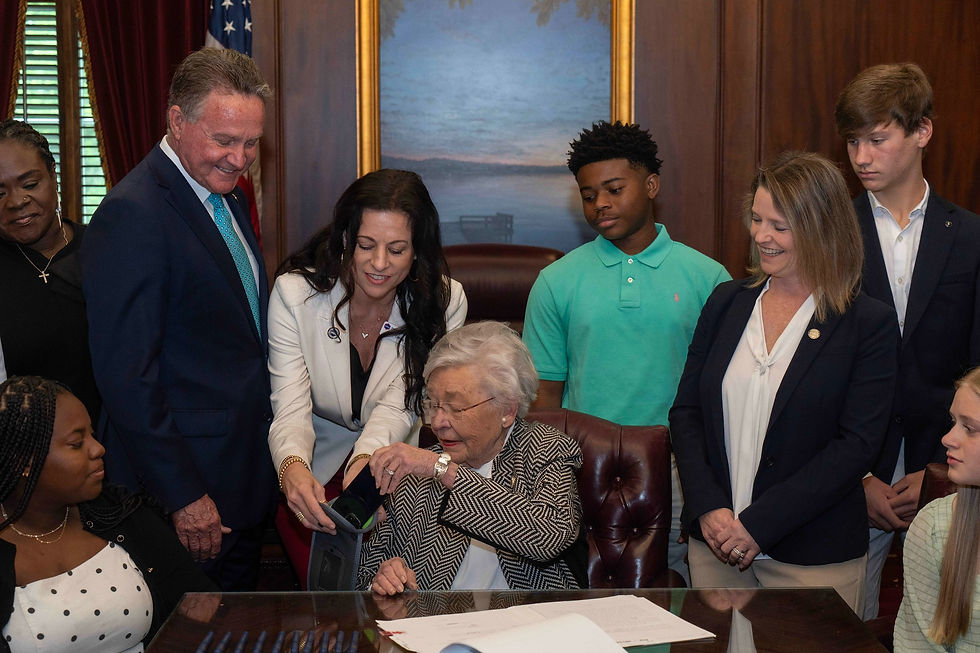No more phones: The FOCUS Act
- Ruth Graham

- Oct 13, 2025
- 3 min read

Freeing Our Classrooms of Unnecessary Screens for Safety Act, or FOCUS Act for short, is the Alabama bill that our state legislature gave final passage to on May 7, 2025, which Governor Kay Ivey signed into law on May 14. The 2025-2026 school year at VHHS began with some frustration as we students were forced to figure out how to go through the school day without the entertainment, communication, and convenience of a cell phone. Now that we’ve gotten used to it, some frustration still remains. But how in-depth is your understanding of the FOCUS Act? Do you know what exactly the law stipulates or why it exists in the first place? Hopefully, after reading this article, you will!
VHHS has been trying to get cell phone use under control for a while now, but the FOCUS Act has provided a few specific guidelines for schools statewide. First of all, “wireless communication devices” (including anything that is capable of “exchanging voice, messaging, or other data communication with another electronic device”) must be turned off and stored in a place indicated by your school principal. Here at Vestavia, they need to be in a backpack or locker. They must not be accessed during “instructional hours,” or bell-to-bell. The exceptions to the rule include life-threatening emergencies, individual student-required accommodations, and occasions where cell-phone use is an “educational need” and supervised by school personnel. The FOCUS Act also requires Alabama schools to educate 7th graders on how to have a safe relationship with social media.
But why a state-wide ban? What prompted action from the state legislature? The FOCUS Act is actually rooted in several studies. One study done in the UK in 2016 found a strong correlation between strict phone bans and a rise in test scores, especially among low-performing students. And Governor Kay Ivey cited one from the Pike Road school district when she signed the FOCUS Act into being. This Alabama school district accomplished a drastic improvement in PSAT scores following its implementation of a no-phone policy. Global discontent with teenagers’ use of cell phones was sparked by The Anxious Generation, by psychologist Jonathan Haidt. In his novel, Haidt argues that widespread cell phone usage was the cause of increasing mental health issues among adolescents. Teachers thus began expressing their growing concern over the impact of phones on student mental health and academic performance, and our Alabama legislature decided to take action.
Many people are, nevertheless, unhappy. The act had virtuous intentions, but a state-wide ban poses some problems. One of the foremost arguments against the FOCUS Act is that it creates a barrier between students and their families, a barrier that could pose significant safety issues during an emergency. Many believe that it also neglects the potential positives of cell phone usage. According to one student here at Vestavia, the FOCUS Act “fails to acknowledge how intertwined with technology our education has become.” And it’s true that before the state-wide ban, teachers had the autonomy to use phones as a means of enhancing their students’ classroom experience. One VHHS student explained that she doesn’t “hate the act” but rather “[prefers] how it was before because teachers were in charge. So, when it was appropriate, we could use our phones.” An unhappy student at Spain Park High School responded to the FOCUS Act by starting a petition; it has gained thousands of signatures. The petition argues for cell phone use to be allowed during lunch periods and between classes. The VHHS students that I interviewed expressed similar wishes. Some argued that the state should have left it up to individual schools to address issues regarding cell phones. “Schools should have the ability to regulate rules specific to their needs and [the] behavior of their student body,” one student said. Another said, “I think it was good to have school rules; however, when it is a law, it prevents the school from using its own discretion.”
So, what do you think? I encourage you to consider how the FOCUS Act has impacted your high school experience. You can have a tangible impact on the future of VHHS and the experience of the students who come after you. So do your research, and speak out! And whether or not you agree with the FOCUS Act, our community and our generation must move forward seeking to live with technology in a healthy way.




Comments